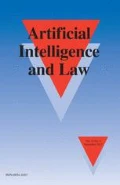Abstract
This paper presents a new algorithm to find an appropriate similarityunder which we apply legal rules analogically. Since there may exist a lotof similarities between the premises of rule and a case in inquiry, we haveto select an appropriate similarity that is relevant to both thelegal rule and a top goal of our legal reasoning. For this purpose, a newcriterion to distinguish the appropriate similarities from the others isproposed and tested. The criterion is based on Goal-DependentAbstraction (GDA) to select a similarity such that an abstraction basedon the similarity never loses the necessary information to prove the ground (purpose of legislation) of the legal rule. In order to cope withour huge space of similarities, our GDA algorithm uses some constraintsto prune useless similarities.
Similar content being viewed by others
References
Ashley, K. D. (1990). Modelling Legal Argument: Reasoning with Cases and Hypotheticals. MIT Press: Cambridge, MA.
Beierle, C. et al. (1992). An Order-Sorted Logic for Knowledge Representation Systems. Artificial Intelligence 55:149–191.
Fujita, H. & Hasegawa, R. (1991). A Model Generation Theorem Prover in KL 1 Using a Ramified-Shack Algorithm. In Logic Programming. Proceedings of the Eight International Conference, 535–548. MIT Press: Cambridge, MA.
Haraguchi, M. (1995). A Reasoning System for Legal Analogy. Machine Intelligence 14: 323–346.
Hart, H. L. A. (1958). Positivism and the Separation of Law and Mortals. Harvard Law Review 71: 593–629.
Inoue, K., Ohta, Y., Hasegawa, R. & Nakashima, M. (1993). Bottom-Up Abduction by Model Generation. In IJCA1-93. Proceedings of the Thirteenth International Joint Conference on Artificial Intelligence, 1: 102–108. Morgan Kaufmann: San Mateo, CA.
Muggleton, S. (1988). A Strategy for Constructing New Predicates in First Order Logic. In EWSL 88. Proceedings of the Third European Working Session on Learning, 123–130. Pitman Publishing: London.
Muggleton, S. (1990). Inductive Logic Programming. In Arikawa, S. (ed.) Algorithmic Learning Theory, 42–62. Springer-Verlag: Berlin.
Nebel, B. (1990). Reasoning and Revision in Hybrid Representation Systems, LNAI 422. Springer-Verlag: Berlin.
Nitta, K., Wong, S. & Ohtake, Y. (1993). A Computational Model for Trial Reasoning. In Proceedings of the Fourth International Conference on Artificial Intelligence and Law, 20–29. Association for Computing Machinery: New York.
Ohtake, Y., Nitta, K., Maeda, S., Ono, M., Osaki, H. & Sakane, K. (1994). Legal Reasoning System HELIC-II. Transactions of Information Processing Society of Japan 35(6): 986–996.
Okubo, Y. & Haraguchi, M. (1994b). Constructing Predicate Mappings for Goal-Dependent Abstraction. In Arikawa, S. (ed.) Algorithmic Learning Theory '94, LNAI 872, 516–531. Springer-Verlag: Berlin.
Plaisted, D. A. (1981). Theorem Proving with Abstraction. Artificial Intelligence 16: 47–108.
Rouveirol, C. & Puget, J. F. (1990). Beyond Inversion of Resolution. In Machine Learning: Proceedings of the Seventh International Conference, 122–130. Morgan Kaufmann: San Mateo, CA.
Tenenberg, J. D. (1989). Abstracting First-Order Theories. In Change of Representation and Inductive Bias, 67–69. Kluwer Academic Publishers: Dordrecht, the Netherlands.
Walter, C. (1988). Many-Sorted Unification. Journal of the Association for Computing Machinery 35(1): 1–17.
Yoshino, H., Haraguchi, M., Sakurai, S. & Kagayama, S. (1993). Towards a Legal Analogical Reasoning System. In Proceedings of the Fourth International Conference on Artificial Intelligence and Law, 110–116. Association for Computing Machinery: New York.
Author information
Authors and Affiliations
Rights and permissions
About this article
Cite this article
Kakuta, T., Haraguchi, M. & Okubo, Y. A Goal-Dependent Abstraction for Legal Reasoning by Analogy. Artificial Intelligence and Law 5, 97–118 (1997). https://doi.org/10.1023/A:1008272013974
Issue Date:
DOI: https://doi.org/10.1023/A:1008272013974




